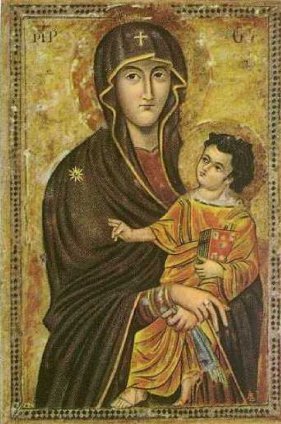
 HE PATRON SAINT of butchers, brewers, bookbinders, and bachelors. Also of lacemakers, notaries, and Hermersdorf, Germany. But, most importantly for our purposes, Saint Luke the Evangelist is the patron saint of artists, painters, and sculptors.
HE PATRON SAINT of butchers, brewers, bookbinders, and bachelors. Also of lacemakers, notaries, and Hermersdorf, Germany. But, most importantly for our purposes, Saint Luke the Evangelist is the patron saint of artists, painters, and sculptors.
Tradition holds that St. Luke painted this image of our Lady around AD 60, when Mary had gone to live with St. John the Evangelist. Luke supposedly made a visit and wrote the icon on a cedar plank from a table Jesus had built for the Holy Family’s home in Nazareth.
Had he not authored the third Gospel and the Acts of the Apostles, St. Luke would likely be a little-known figure to us. He is mentioned only three times in the New Testament (Philemon 24; Col 4:14; 2 Tim 4:11). We know that Luke was born of a pagan family in Syria and that he was a doctor with medical training. It is also clear from the Scriptures that St. Luke never met Jesus Christ in person. Luke apparently came to faith through the preaching of St. Paul, with whom he traveled.
This makes Luke, I think, a great model for us moderns, who are all in the same boat. Sure, we have the Real Presence of Christ with us in the Eucharist. But none of us had the opportunity to walk the roads of Galilee with Jesus of Nazareth. We have all come to faith through another person—perhaps our parents, or a friend, or an inspiring preacher.
Although St. Luke never saw the Lord face-to-face, he also never used that as an excuse to be less of a disciple. Sometimes, we feel like the Apostles had an advantage. We think it would be easier to have faith if we could spend three years traveling around the Holy Land with our Lord, watching him perform miracles and healings. But Luke seemed not to consider himself at a disadvantage.
Luke accepted his call to be an Evangelist, writing icons and even a Gospel that became one of the four major means by which all of history would come to know Jesus Christ. We must do the same. We must become evangelists for those around us, testifying with joy to the faith we have in Christ.
Perhaps we may evangelize through the written word, or even through artistry, painting, or sculpture. St. Luke, pray for us!

